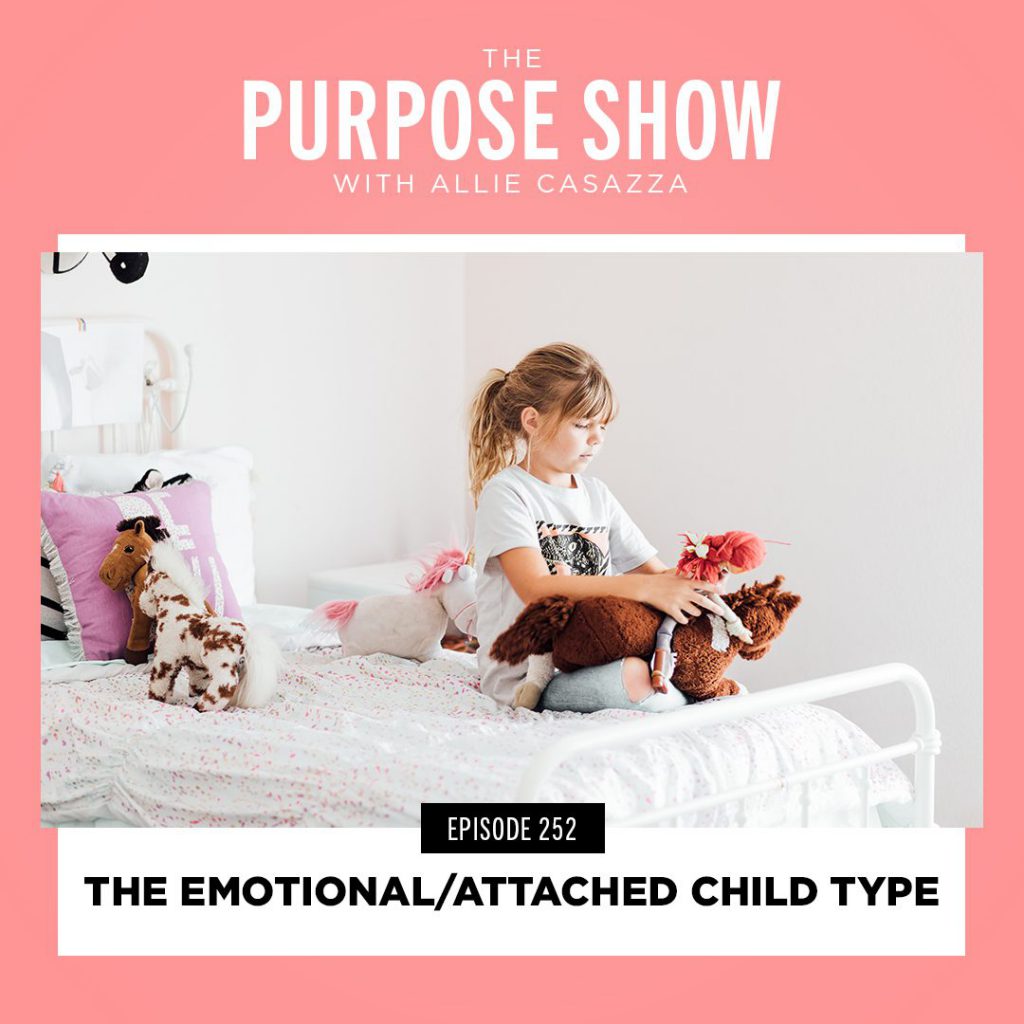

Today’s conversation is about kids, specifically kids that tend to be Emotional and Attached to their things. I want to shift your perspective, shine a light on some important things, and give you some free support in this area. Let’s dive in!
In this episode Allie discusses:
- The beauty of having an Emotional and Attached child
- Two ways to communicate with them
- Tip to help them transfer their emotions from things
Mentioned in this Episode:
Courses (Use the code PURPOSESHOW for 10% off!)
The Purpose Show Facebook Community


We’re surrounded with the message that it’s the tired life, the no-time-for-myself life, the hard life. And while it can be hard and full of lots of showing up for others, the idea that being a mom means living a joyless, stale, or shit-show life all the time is something I am passionate about putting a stop to.
I’m Allie Casazza, and I’m about to make your life so much lighter.
I’m the best-selling author of the book, Declutter Like A Mother, and the creator of several life-changing online programs that have enrolled tens of thousands of students.
If you’ve been feeling chronically behind, if you wake up feeling exhausted for a day that hasn’t even started yet, if you constantly feel like you don’t have time for the things that really matter to you, I’ve got you.
I went from being a completely overwhelmed, depressed, struggling mom of three babies and toddlers who, I’ll be honest with you, didn’t want to be a mom anymore because I felt like I was failing so hard at it every day.
Through a lot of figuring out, searching for help, inner work, and shifting how I was doing and being, I found that the less I had in my way, the more joy, focus, and purpose I brought into my life. We have to define what is in our way and what is actually worthy of our energy.
I went from blogging about my journey to becoming the founder of a multi-million dollar online business, all based on helping women live better, lighter lives.
Join millions of listeners around the world for conversations that will lift your mood, focus your intention and raise your vibe week after week.
We talk motherhood, lifestyle, wellbeing, and simplifying everything from home to schedule to business.
Listen, this is about not just waking up and reacting to our lives and letting the day run us, but setting the intention, taking ownership of every single day, and making life work for us, making it easier.
Friend, I am so glad you’re here! I’m Allie and you’re listening to The Purpose Show.
Hey friends! Because it’s so important to me that I am able to authentically be myself and I want to speak the way that I normally speak here on my podcast, you’ll find the occasional curse word in my show. So if that bothers you or it’s not something that you want your kids to hear, grab your headphones.
In the show you’ll also find some episodes with adult themes, just things that are a little bit too mature or hard to process for young ears. So, in general, headphones might be a good idea. I love you guys. I’m glad you’re here and enjoy this episode.
This episode of The Purpose Show is proof that I am a working mom with a million kids and a renovation happening. I was going around my house doing my thing and I had this idea for this episode. The kids were busy playing, Brian was working on projects and I saw the opportunity and grabbed it.
I grabbed my AirPods and hid in my closet to get this recording quickly done while it was fresh in my mind and I was feeling inspired. And I didn’t hook up my headphones correctly, so it was recorded with just my phone microphone and the sound quality is less good than it normally is.
You can completely hear what I’m saying otherwise I wouldn’t use it, but it’s just not on my normal mic and it’s not with my normal headphones and it’s not the best. I want to just put it out there that there’s nothing wrong with your speakers or your headphones, it’s just the way I recorded this one.
But the content is incredible and I’m really proud of it. I think it’s going to help a lot of you. I left it because done is better than perfect and I’m practicing what I preach. Please enjoy this episode anyway.
Hello friend! Welcome to The Purpose Show podcast. Thank you for letting me be a part of your day today. It’s my favorite thing. I’m so glad you’re here!
Today’s conversation is about kids, specifically kids that tend to be Emotional and Attached to their things. Since one of the main things that I teach and talk about is decluttering, simplifying, how much your environment affects you, and how important it is to not have stuff everywhere, I want to speak specifically.
I’ve never done this on the podcast. I speak and teach extensively on this topic and many others in my programs and there’s a section on this in my book, but it’s not really this in-depth.
I want to have this conversation because it’s such a common question. When I’m interviewed on other people’s shows, it’s almost always asked. I see it in my DM’s all the time.
It feels like a huge problem to people. It feels like a problem that’s too overwhelming to fix. But I want to shift your perspective, shine a light on some important things, and give you some free support in this area.
In the method that I’ve developed for teaching kids this lifestyle of simplicity without feeling like they’re deprived, I have worked with a child play therapist. Her name is Amy Tirpak. She’s on Team Allie. She’s incredible.
We worked together to create our program, Uncluttered Kids, and created The Five Types Of Kids. The types are basically the kid’s personality and their motivation combined. That’s what defines each type.
I won’t get into the five types. That’s in the book and it’s in the program. All of that is there for deeper support if you need it.
There’s also a free quiz that Amy and I developed that you can go online and take. I’ll give you that link right now and you can go take it and find out what personality/motivation type your kid is as it relates to receiving information and understanding what you’re communicating.
You’ll learn what motivates them so that you can use that in your parenting as you communicate lifestyle changes you want to make to improve your family’s quality of life in a way that your kids can receive. Things that you’re trying to shift can so often feel like a random punishment to kids. For example, you want to eat better, but to them it can feel like you’re taking away their favorite foods and they can get really fussy and not understand or throw a fit.
The same goes when you’re trying to shift from not being consciously aware of your environment, home, stuff, clutter, and consumerism to being conscious of that. Becoming more intentional, shifting the way you’re doing things, getting rid of stuff you don’t love, need, and use, to make things better. Kids can really push back and that can be difficult and frustrating as a parent.
So there are five different types of personalities and motivations when it comes to this kind of stuff. You can go to alliecasazza.com/kidsquiz and take that quiz for free to find out which type or combination of types your children are.
Today, I want to speak specifically to the Emotional and Attached personality motivation type. I have one of these. It’s my daughter, Bella. I feel like the Emotional and Attached type is the type that most people are afraid to have. Or they recognize that they have a child that’s very emotional and attached to everything and they bring it to me like it’s a problem that needs to be solved.
I want to say that the Emotional and Attached type is actually my most favorite, partly because I love a challenge and it can be a little more challenging to express why this is important to these kids. You’re trying to do them a favor, right? You’re trying to get them to live lighter and not have to carry so much into their future. Not have to be overwhelmed and not have a stuff problem.
And you’re trying to make your life lighter too, so that you can be a more present parent. You’re trying to do them a favor. It can be more challenging for sure.
The main reason that these kids are my favorite is because I have yet to meet a child who is the Emotional and Attached type that is not also an empath. Empathic kids are so beautiful and so amazing. Empathic people are so amazing.
I’m an empath. I was always this kid who was super sensitive to everything. I could feel everyone’s feelings. I would feel everything all the time and all at once.
I had such big feelings. I could sense other people’s feelings without them even communicating them. I’m still like that. It serves me so well in my relationships and in my business.
I have yet to find and Emotional and Attached kid that is not a big feeler and so beautiful, kind, sensitive, sweet, and giving. They just have so many big, beautiful feelings. That’s amazing. That’s great. I love those kids. I think it’s great.
I think that the idea that it’s a difficult problem to be overcome, that it’s something that needs to be fixed and we need a solution to, is really a skewed and unhelpful way of seeing these children.
Realize that you have an empath on your hands and that this person is such a feeler. They’re going to help so many people simply by caring, by listening to people, by wanting things to get better for other people. These are the world changers, right?
Part of them being an empath, a feeler, and a highly sensitive person is that they attach souls, personalities, and heartbeats that don’t exist to inanimate objects. They treat them like they are so special, like they have a soul, like they’re alive.
Like this random rock they found last Tuesday is now their pet. It’s the most precious thing in the world to them. Of course you can’t throw it away. Why would you even say that?
It’s just these big feelings over things that are very small to us. Those are some of the ways that an Emotional and Attached type might show up. How they might act towards things.
And so it’s very, very, very, very difficult for them to get rid of their stuffies. For them to part with their toys. For them to part with their clothes, even if they’ve outgrown them. It’s a part of who they are.
However, this type needs this method. They need this lifestyle. They need this lesson more than all the other types by far. And here’s why…
Kids that are empaths, that are emotional and attached when it comes to their things, they are going to grow up like that. They’re going to be that personality type as adults.
If they’re not taught how to have a healthy relationship with things, they’re going to carry issues with things into adulthood and probably struggle with it for the rest of their lives, because no one taught them how to have a healthy relationship with things or how to differentiate between their memories and the strong feelings they’re feeling with the item itself.
Often, these are the types of people that do end up struggling to let go of things and some even end up with hoarding disorders. They just can’t seem to make decisions. They can’t understand why it’s such a huge struggle to let go of the most basic, simple things.
Maybe you’re listening to me talk right now and you’re thinking that you are like that. Maybe no one taught you how to differentiate between memories and your feelings from physical things. I know that that’s something that I struggled with as a kid because I’m an empath and I was Emotional and Attached.
And look where it got me as an adult. I had so much crap everywhere. I was so overwhelmed in my life that I got extremely depressed. I couldn’t keep up. It was stealing my time, my energy, and my motherhood from me.
I had to teach myself how to walk through this process. Let’s spare them that. Emotional and Attached kids need to learn how to process their emotions and feel their feelings without having unhealthy habits that ultimately cause them harm and hurt their mental health and their general wellbeing.
So if you have an Emotional and Attached child, which you can go take the quiz and find out, they need this more than anyone. They’re not a problem to be solved. They are not in need of this radical change. They’re not an issue you need to fix or have to figure out. They’re not an inconvenience.
You are so, so blessed to have this child. To have a child that is this way. They are going to change the world. They are going to impact people in the biggest and most gentle, most sensitive, beautiful way.
Every personality type has pros and cons, right? It’s kind of a black and white way of looking at it. I don’t really love it, but just go with me here for the sake of explaining it.
The pro is they change the world and touch people in ways that most people can’t touch them. They impact people in a way that most people can’t. They notice things that most people don’t notice. They feel things most people don’t feel. And that’s so needed.
One of the harder things, or con if you will, is that they struggle with letting things go. And that can be emotional things, too. When someone hurts their feelings, they really tend to hold grudges.
Or they’re just more emotionally impacted by things. They have a harder time letting things slide off their back. And quite literally, they have a harder time letting physical things go.
Okay, friends, you guys probably already know how much I absolutely love hosting challenges. I am all about getting you to not just listen to my podcast, not just read my books, not just take in my content, but actually do something with it and about it.
I want you to actually take action and not even just action, but real action that’s going to lead to lasting change that’s really going to move the needle forward for you, your family, your goals, your lifestyle and lead to you feeling so much lighter, so much better. And having the benefits and rewards of that leak into your family, your kids, your relationships, your schedule, your day and how you’re feeling, your energy.
I’ve got a brand new challenge that’s going to really specifically benefit you as it relates to your kids. It’s called Clutterfree Kids 101. It is a free four-day challenge with me starting on February 7th.
I’m going to give you the links. You can go sign up now. I’m gonna tell you a little bit more about it after that. Go to alliecasazza.com/kids101. You can sign up. Again, it’s totally free! All of my challenges so far have been free. It is my gift to you. I’m super, super excited for this one specifically.
This is the challenge for parents that’s about kid clutter, because really, it starts with you. I feel like people don’t realize what a layered issue kid clutter is, what a process it is, and how much of it is about you and your relationship to your kids’ space, your relationship to their stuff and how you are raising them.
Your kids are experiencing life so much of the time through you as their parent. That doesn’t need to be a burden. That’s actually your power. You can use that to help get your kids where you want them to go as their parent, as a guide in their life, how you want them to experience life, the burdens you want to save them from, giving them the shortcuts so they don’t have to go through some of the BS that we’ve had to go through, right?
This is a challenge for the parent that’s really going to benefit your kids.
I think as parents, we often put the blame for all the kid clutter on the kids like they’re supposed to naturally know how to let things go. We get frustrated when they won’t. We say things like, “They’re just resisting me. They don’t understand what I’m trying to do.”
It’s not easy. It doesn’t come naturally to kids. We have to teach them. It’s a skill that’s built up with practice and experience, and that is going to have to come through you, the parent.
Think about yourselves and if you’ve needed help. You probably have. It’s not easy to shift into a new way of living lighter, more minimalistic, with less clutter, less stuff. And we don’t want our kids to go through all the materialism and consumerism stuff we’ve had to go through, and start to purge and learn everything we’ve had to learn.
Let’s teach this to them now, whether they’re two years old or teenagers, right?
There are tens of thousands of women in my challenges, listening to the podcast episodes that I publish, reading my books, and the paid programs, because they need help. There’s no shame in needing help. Let me support you in this.
It would make sense if you need help, that your kids might also need help with this, right? We can’t expect them to do this easily and just get rid of your stuff as if we, as adults, don’t need help.
It’s a skill that we need to teach our kids and this is what this challenge is all about – really getting into the first steps of helping your kids lead a clutter free, less burdensome lifestyle.
Clutterfree Kids 101. It’s a 4-day challenge. Totally free! Live every day with me. I’m going to be teaching you, guiding you. It’s going to be amazing!
We start February 7th, 2022. alliecasazza.com/kids101. Go sign up! I want to see you in there!
This is very layered. There are so many layers and angles, and there’s so much that I have to say on this topic. It’s why I write books. It’s why I have Uncluttered Kids in a completely separate course from the one about your home, because it is a very deep, very layered, and serious issue.
It’s why I pulled in a child play therapist to help create that course with me because I’m not messing around with this stuff. I see the importance of this every single day. Please go and invest in that support if you need it.
It will change your life. I guarantee it. I’m saying, I guarantee it, and I stand by that statement. My work is impactful and it is worth every penny times thirty. Uncluttered Kids is there and it will change your life, your family, and your children for the better.
Also the kids’ book, Be The Boss Of Your Stuff, is coming out March 1st. It is written by me and my kids for your kids. It will teach them this for you. Go and preorder that right now. You get a free course that’s made by my kids for your kids to watch. You get that right away so they can watch that while you wait for the book to come out.
What I’m going to say here is I’m going to give you a little tip that is very easy and very conversational, because here’s the thing I want you to understand before I share the tip: There are two different pieces of communicating with Emotional and Attached kids, to any kid really, but we’re talking about Emotional and Attached kids here in this episode.
There are two different ways of communicating to them. The first is really unspoken. Think about this in your family. You have so many things that everybody knows in your family that you’ve never actually spoken out loud.
For example, if you are vegan and you don’t eat meat, it’s a part of your family culture that you don’t eat meat. If you were going to have chicken for dinner that would probably require you to announce it and have a conversation about why you’re serving chicken for dinner because you don’t eat meat.
That’s a part of your family culture. And having chicken for dinner is weird. That’s new. It’s different.
But for the family next door, if the mom said, Everyone, sit down. We have to talk. We are having chicken for dinner, and they eat meat all the time, that’s going to feel strange because their family culture is that they have meat with their dinners regularly. Their family culture is to eat meat.
Everybody has a family culture, the unspoken language that runs through your family that is communicated through how you eat, how you prepare your food, how you buy things, how you spend time when you’re just hanging out at home. There’s unspoken communication all the time, and I call that your family culture.
If you want to shift that family culture, you do that by shifting the way that you live and you don’t really need to communicate anything. You can do this as it relates to things—buying things, and the things that you already have—pretty easily.
The second part of communicating this to your Emotional and Attached children is actually communicating to them. Having conversations if they’re three years old or older. Obviously, you make this age appropriate but saying something like, I’ve been learning about this. I’ve been getting rid of some of the things that I don’t really like, need and use and I feel so much better.
Stay away from the word “love” because your Emotional and Attached child loves everything. Look at this pile. This is called clutter. And man, I just feel so much better without this.
You’re leading by example. You’re communicating to them by using your stuff as an example. You’re not even talking to them about their own stuff. You’re not even trying to get them to look at their own things and make decisions. You’re not even close to being to that part of this journey yet.
With Emotional and Attached kids, the process is longer. It just is. And that is not a con. That is not a bad thing. It is not a problem. Remember it is a part of having one of the most beautiful types of human beings that exists: the sensitive one.
Talk to them. Bring them in and let them a part of you decluttering. Let them see you making decisions about your things. They’re helping you by taking the items and putting them in the pile for you.
They’re processing— Okay, mom is doing this. She’s talking to me about this. And she’s doing this. I see my mom doing this.
You’re communicating the process as you’re explaining it to them while you’re doing it. You’re communicating via the family culture that we talked about a moment ago, because you are doing this and they’re seeing you do it.
Now, here’s the tip I want to give you. When there’s a time, maybe you’re with your kids, you’re cleaning up the room with them, or you’re picking up the toys that they left downstairs, or whenever it feels natural. Or maybe you’re ready and you are going to declutter with them and you’re having some conversations with them, whenever you’re around them and their stuff in some way, pick up something.
Maybe you pick up a stuffed duck and say, Do you remember who gave this to you?
And if they’re like, Oh, my Nana gave that to me.
You say, That’s right. Nana gave that to you. When did she give it to you?
…On my birthday.
You may notice if the child really is the Emotional and Attached type that they may want to take the ducky from your hand, hold it, squeeze it, look at it, or cradle it. Or they might just start glowing and beaming, talking about the time that Nana gave them the stuffed ducky and the birthday party and everything.
As they’re starting to share who gave them this toy and the situation they were in when they got the toy, start to divert the good feelings and good emotions your child is sharing with you about that from the toy to the person or from the toy to the situation.
Going with Nana and the stuffed ducky for our example, you might start to say, Nana loves you so much. Nana, she is just so nice to spend time with, huh? You love your Nana. Isn’t it so nice when she comes over and she brings you butterscotch lollipops? That’s so yummy when she does that. I love it when she hugs you. Don’t you love it when she hugs you and she tells you that she loves you every time she sees you? Don’t you love it when she gives you a kiss on the cheek and she leaves some lipstick on yours? Oh my gosh, that’s so silly. You love your Nana.
You are shifting these positive emotions from the thing to the person that the thing reminds them of. Or you can talk positively about their birthday party if it was a gift from someone at their party and you don’t know who gave it to them and they don’t remember, which I would be surprised because an Emotional and Attached child usually remembers. You’re shifting the energy of those positive emotions to where it actually belongs.
It’s actually not about the stuffed duck. It’s not about the thing at all. It’s about the person, the love, the feelings, the experience, the positive emotions that that child has attached to the thing.
We know that our memories and our emotions are not actually stored in stuffed animals or shirts or sweaters or gift cards or whatever things we are holding onto. It’s in us. It’s the energy of the emotions of the person that gave it to us.
The thing that we love is the person. The thing that we love is the situation that it reminds us of, the memory that’s attached to it. And we can access those things any time.
It is so common in humans to do this. To take a positive emotion, a positive experience, and accidentally attach it, unconsciously attach it to the wrong thing. This is personally a huge part of my work with how I overcame emotional binge eating.
I was attaching positive emotions and memories from my childhood to food, to the food that was around at the time. And so, then I learned food is love. Food makes me feel good.
Well, no food doesn’t make me feel good. Actually, I feel like crap after I eat that junky food. But it’s reminding me of things.
I can access those memories, I can access those good feelings and that self love anytime. Food has nothing to do with that.
It’s normal. There are a lot of ways people do this. People do this with all kinds of unhealthy things, right? That’s why we have an addiction issue.
Most of the time we’re attaching something to something else that it doesn’t need to be attached to. Not that this is going to lead to addiction, that’s not what I’m saying. But it’s just a very common, normal thing to misplace those positive feelings.
You can teach your kids without even saying anything about actually teaching them and explaining it to them just by the way you speak to them. The way you remind them of how much Nana loves them and how much they love her. By giving them those positive feelings and not making it about the stuffed duck, not making it about whatever the toy is, whatever the items are, whatever the clothes are.
Remind them of how much you love them. They’re growing and they’re getting bigger and you’re just so proud of them. You love them so much. But these clothes don’t fit the new them, do they?
Show them—you are amazing. You are beautiful. You are loved. You are growing. And it’s so good that you grow.
Pull the emotions out of the old t-shirt that doesn’t fit them anymore. Pull the emotions out of the stuffed duck. Remind them where they belong: With Nana. With dad. With the person that gave them this present. With the memory of their birthday party. With the memory of that Christmas that was so fun last year. Whatever it is.
This is a very early step. The process with the Emotional and Attached child type is so much longer than the other four types. And that’s good. That’s okay. It makes sense for these kids.
It’s worth the extra time. It’s worth the patience. Never rush it. Never, ever declutter your kids’ things when they’re at school or asleep or not there.
It is always worth it because you are teaching them how to manage their emotions. You are teaching them life skills and mental wellbeing skills that are going to serve them for the rest of their lives.
And if no one teaches them, they’re going to struggle with some unhealthy habits, with possibly some dysfunction. You are their parent. You are their teacher here. And this is such an opportunity to teach them healthy balance with their emotions, their attachment, how much they feel everything, how everything has a soul and everything’s important.
Let them be. You don’t need to go and declutter right after this, but you’re beginning to point out that it’s actually not about the ducky; it’s about how much they love their Nana.
I hope this resonates. I hope this makes sense. I just want to say that this kind of stuff, it is hard.
It is a lot. And it can so easily just go wrong, causing your child to not understand or feel like you violated their space or that you’re not hearing them. And again, it’s very layered.
Please do not take this episode as, Oh, that’s how I declutter with my emotionally attached kid. No, it’s not. This is just one idea I’m giving you to start to communicate to your kids about clutter, without talking about clutter.
It’s literally just having a normal conversation while you’re picking up at the end of the day. And that’s what I love about it. It’s not sitting down and saying, We have too much stuff. Let’s talk about this. I know you’re attached to all these things, but we have to get rid of some.
It’s not that. It’s not decluttering. That’s not what I’m ever going to have you do.
It’s in the family culture. It’s in the unspoken messages, the unspoken language of your family. It’s in the way that you listen to your kids and validate the fact that they have big emotions over things that seem small to you. That you validate that it might be small to you but it’s not small to them.
That you’re understanding them. That you’re hearing them out. That you’re gently teaching them how to remove the emotion and memories from things and put it where it actually belongs, and feeling that love, feeling those memories, loving those people, and teaching them that it’s not about the stuff.
There are so many other ways I can teach you how to do that and so many other things I can help you do to actually get the clutter out with these kids. But for now, I just want to plant that idea in your head and encourage you to let them feel. Stop viewing them as a problem and start to just teach them what to do with all those big, beautiful feelings they feel all the time.
All right, friends, love you guys so much! Go and pre-order Be The Boss Of Your Stuff. Get your free course for your kids to watch while you wait for the book to show up at your doorstep. And go enroll in Uncluttered Kids if you feel like that would support you. It’s on my website.
That’s it! Have an amazing day!
If you would like a more behind-the-scenes view into my life, this lifestyle, regular life hacks, tips and more content that’s really going to create lightness in your social media feed, follow me on Instagram @allie_that’sme, or you can search Allie Casazza and it’s the one with the blue check mark.
If this episode or any episode was helpful for you, please consider leaving me a review on Apple Podcast. It is literally the lifeblood for a podcaster, and it helps me so much.
Thank you for tuning in. If you would like to learn more from me, how I can help you, how you can implement the things we talk about here on The Purpose Show, leaning more into making life simpler, better and more abundant in the best ways, head to alliecasazza.com. There are free downloads, online programs and other resources to help you create the life you really want in a very deep dive style.
I am always rooting for you, friend. I will see you next time. I’m Allie Casazza and this is The Purpose Show.
Hey mama! Just a quick note, this post may contain affiliate links.




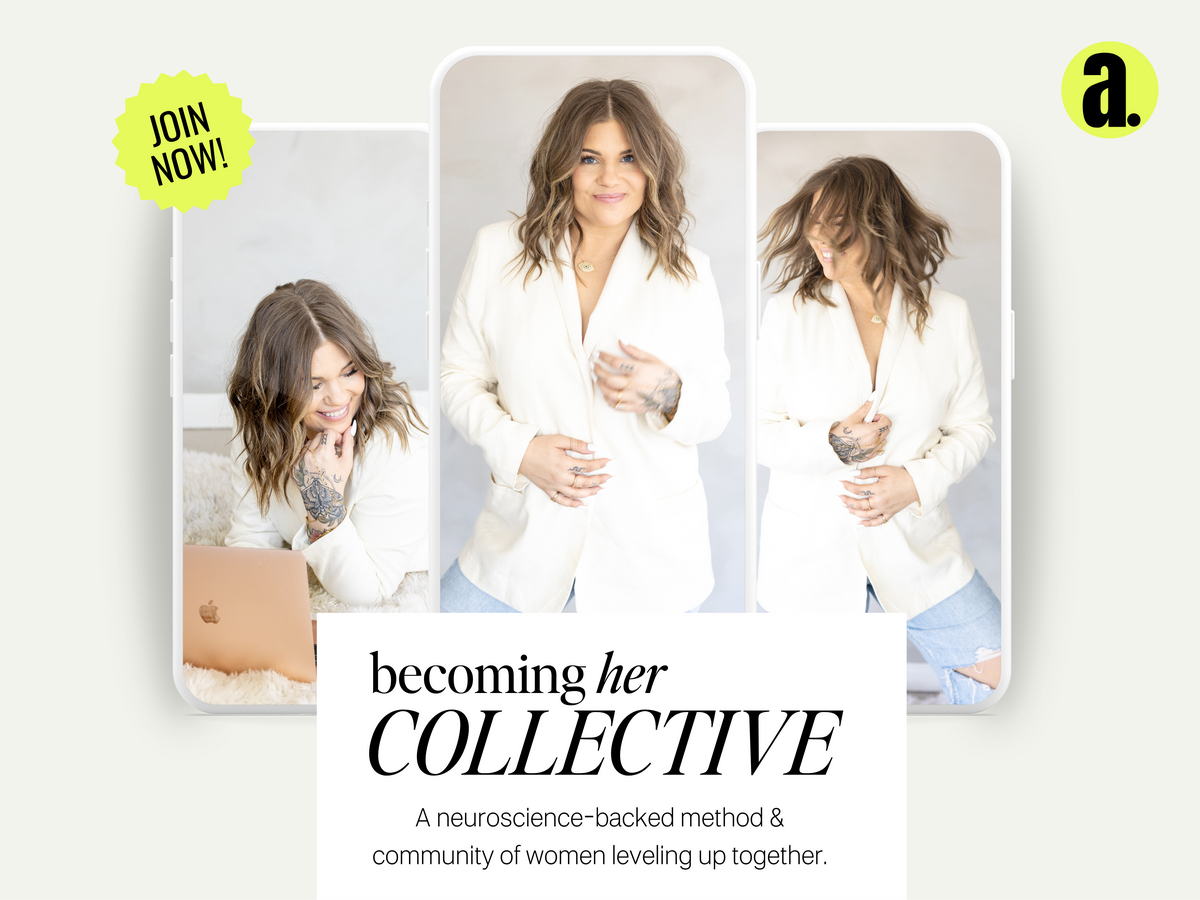

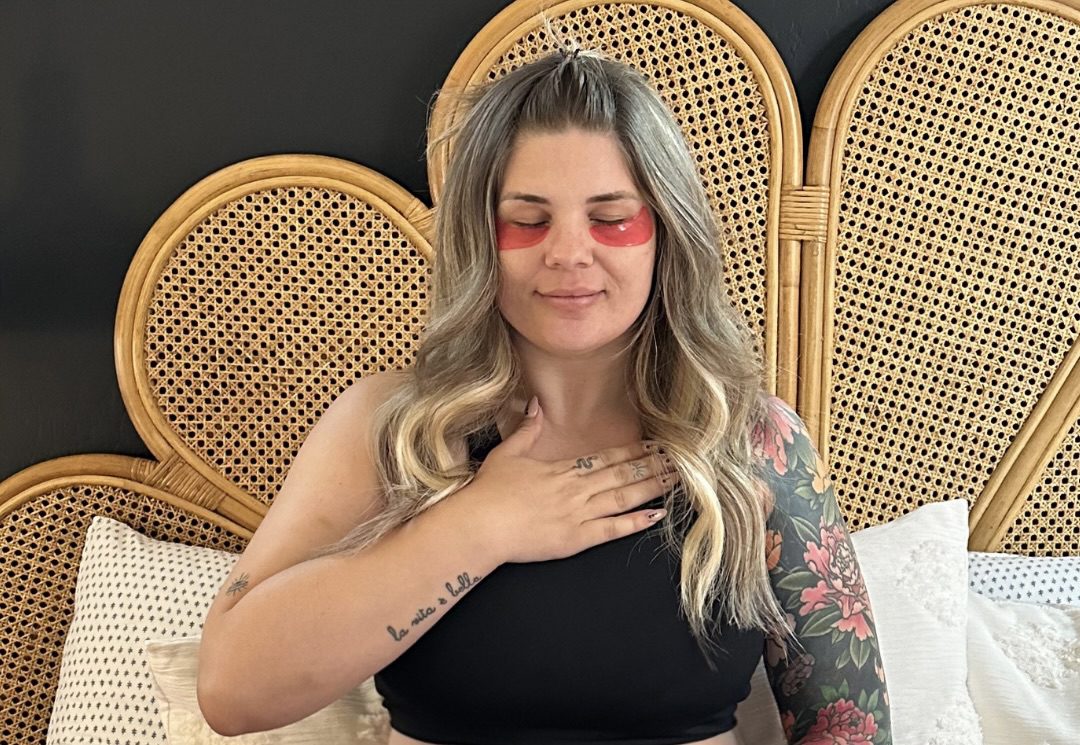

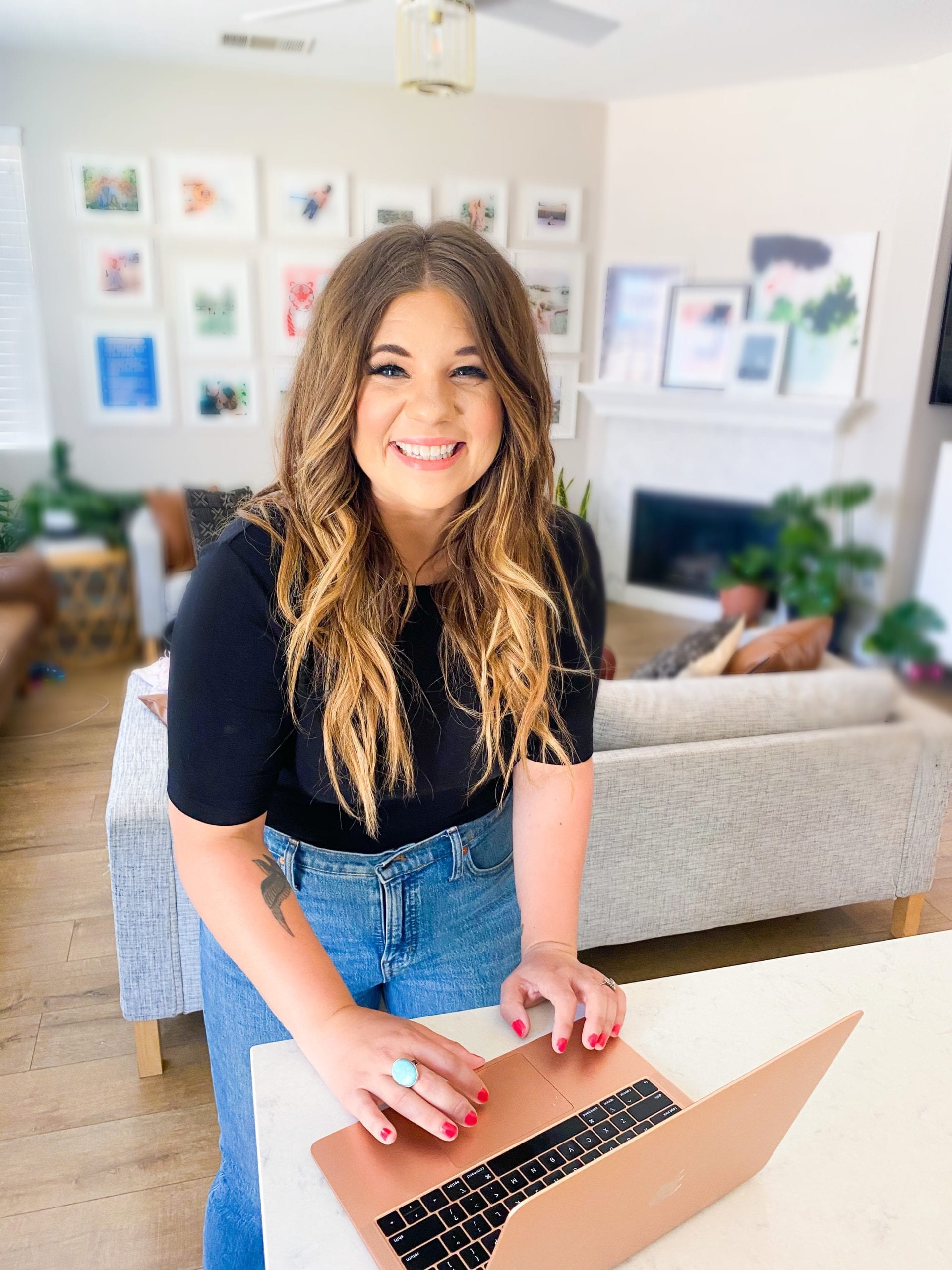

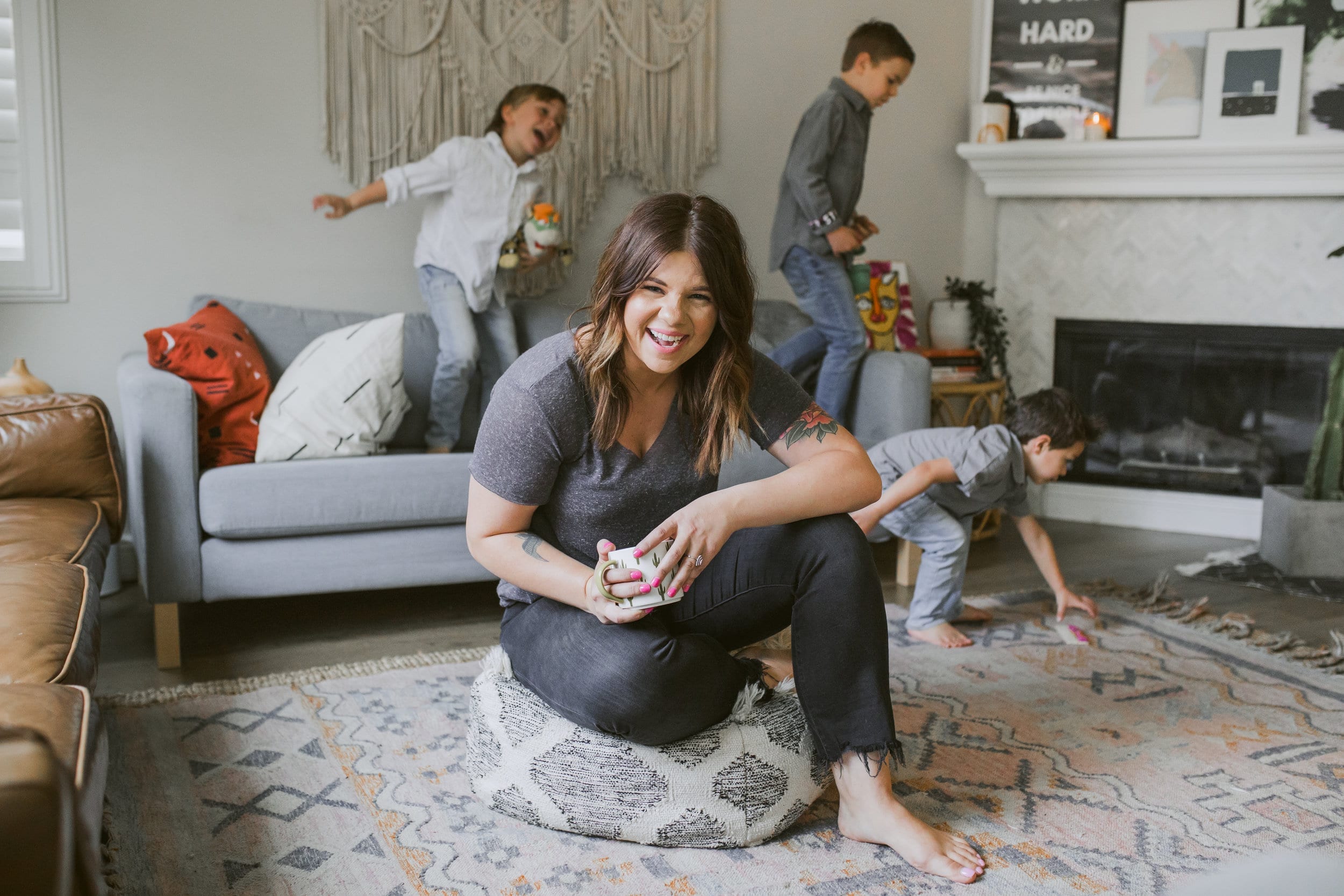

+ show Comments
- Hide Comments
add a comment